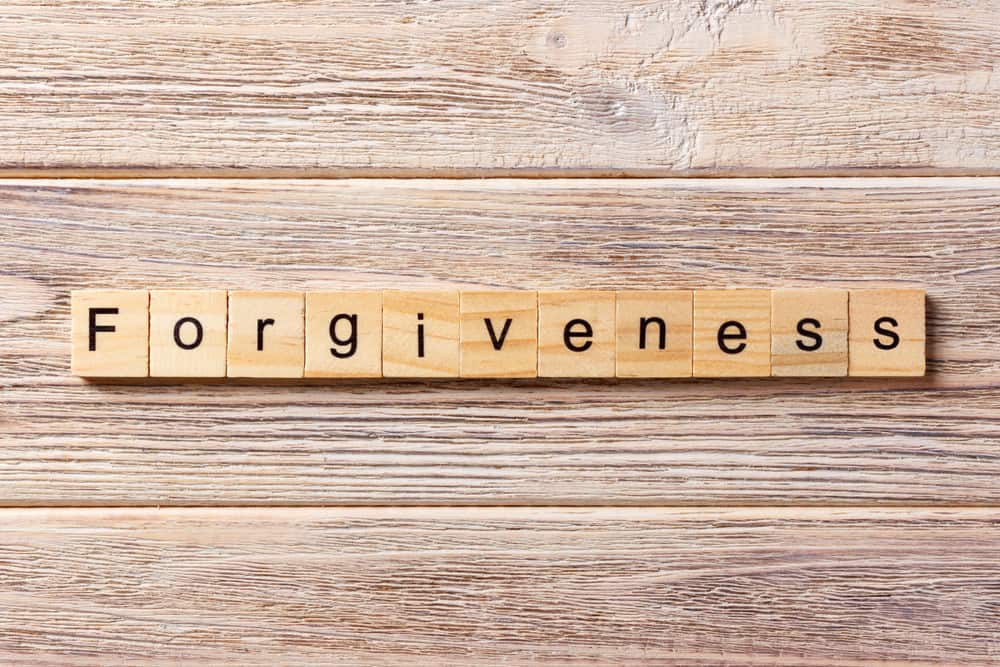
Bitterness vs. Forgiveness

 We need to forgive others in order to be free from our pasts and to prevent Satan from taking advantage of us (see 2 Corinthians 2:10-11).
We are to be merciful just as our Heavenly Father is merciful (see Luke 6:36).
We are to forgive as we have been forgiven (see Ephesians 4:31-32).
Ask God to bring to mind the names of those people you need to forgive by expressing the following prayer aloud.
We need to forgive others in order to be free from our pasts and to prevent Satan from taking advantage of us (see 2 Corinthians 2:10-11).
We are to be merciful just as our Heavenly Father is merciful (see Luke 6:36).
We are to forgive as we have been forgiven (see Ephesians 4:31-32).
Ask God to bring to mind the names of those people you need to forgive by expressing the following prayer aloud.

 Dear Heavenly Father,
Dear Heavenly Father,
I thank You for the riches of Your kindness, forbearance, and patience, knowing that Your kindness has led me to repentance (Romans 2:4).
I confess that I have not extended that same patience and kindness toward others who have offended me, but instead I have harbored bitterness and resentment.
I pray that during this time of self-examination You would bring to my mind those people that I need to forgive in order that I may do so (Matthew 18:35).
I ask this in the precious name of Jesus. Amen.


 As names come to mind, make a list of only the names.
At the end of your list, write "myself."
Forgiving yourself is accepting God's cleansing and forgiveness.
Also, write "thoughts against God."
Thoughts raised up against the knowledge of God will usually result in angry feelings toward Him.
Technically, we can't forgive God because He cannot commit any sin of commission or ommission.
But we need to specifically renounce false expectations and thoughts about God and agree to release any anger we have toward Him.
As names come to mind, make a list of only the names.
At the end of your list, write "myself."
Forgiving yourself is accepting God's cleansing and forgiveness.
Also, write "thoughts against God."
Thoughts raised up against the knowledge of God will usually result in angry feelings toward Him.
Technically, we can't forgive God because He cannot commit any sin of commission or ommission.
But we need to specifically renounce false expectations and thoughts about God and agree to release any anger we have toward Him.
Before you pray to forgive these people, stop and consider what forgiveness is, what it is not, what decision you will be making, and what the consequences will be.
In the following explanation, the main points are in bold print.

 Forgiveness is not forgetting.
People who try to forget find they cannot.
God says He will remember our sins "no more" (see Hebrews 10:17), but God, being omniscient, cannot forget.
Remember our sins "no more" means that God will never use the past against us (see Psalms 103:12).
Forgetting may be the result of forgiveness, but it is never the means of forgiveness.
When we bring up the past against others, we are saying we haven't forgiven them.
Forgiveness is not forgetting.
People who try to forget find they cannot.
God says He will remember our sins "no more" (see Hebrews 10:17), but God, being omniscient, cannot forget.
Remember our sins "no more" means that God will never use the past against us (see Psalms 103:12).
Forgetting may be the result of forgiveness, but it is never the means of forgiveness.
When we bring up the past against others, we are saying we haven't forgiven them.

 Forgiveness is a choice, a crisis of the will. Since God requires us to forgive, it is something we can do.
However, forgiveness is difficult for us because it pulls against our concept of justice.
We want revenge for offenses suffered.
However, we are told never to take our own revenge (see Romans 12:19).
You say, "Why should I let them off the hook?"
That is precisely the problem.
You are still hooked to them, still bound by your past.
You will let them off your hook, but they are never off God's.
He will deal with them fairly, something we cannot do.
Forgiveness is a choice, a crisis of the will. Since God requires us to forgive, it is something we can do.
However, forgiveness is difficult for us because it pulls against our concept of justice.
We want revenge for offenses suffered.
However, we are told never to take our own revenge (see Romans 12:19).
You say, "Why should I let them off the hook?"
That is precisely the problem.
You are still hooked to them, still bound by your past.
You will let them off your hook, but they are never off God's.
He will deal with them fairly, something we cannot do.

 You say, "You don't understand how much this person hurt me!"
But don't you see, they are still hurting you"
How do you stop the pain?
You don't forgive someone for their sake; you do it for your own sake so you can be free.
Your need to forgive isn't an issue between you and the offender; it's between you and God.
You say, "You don't understand how much this person hurt me!"
But don't you see, they are still hurting you"
How do you stop the pain?
You don't forgive someone for their sake; you do it for your own sake so you can be free.
Your need to forgive isn't an issue between you and the offender; it's between you and God.

 Forgiveness is agreeing to live with the consequences of another person's sin.
Forgiveness is costly. You pay the price of the evil you forgive.
You're going to live with those consequences whether you want to or not; your only choice is whether you will do so in the bitterness of unforgiveness or the freedom of forgiveness.
Jesus took the consequences of your sin upon Himself.
All true forgiveness is substitutionary, because no one really forgives without bearing the consequeences of the other person's sin.
God the Father "made Him who knew no sin to be sin on our behalf, that we might become the righteousness of God in Him" (2nd Corinthians 5:21).
Where is the justice?
It's the cross that makes forgiveness legally and morally right: "For the death that He died, He died to sin, once for all" (Romans 6:10).
Forgiveness is agreeing to live with the consequences of another person's sin.
Forgiveness is costly. You pay the price of the evil you forgive.
You're going to live with those consequences whether you want to or not; your only choice is whether you will do so in the bitterness of unforgiveness or the freedom of forgiveness.
Jesus took the consequences of your sin upon Himself.
All true forgiveness is substitutionary, because no one really forgives without bearing the consequeences of the other person's sin.
God the Father "made Him who knew no sin to be sin on our behalf, that we might become the righteousness of God in Him" (2nd Corinthians 5:21).
Where is the justice?
It's the cross that makes forgiveness legally and morally right: "For the death that He died, He died to sin, once for all" (Romans 6:10).
Decide that you will bear the burdens of their offenses by not using that information against them in the future.
This doesn't mean that you tolerate sin.
You must set up scriptural boundaries to prevent future abuse.
Some may be required to testify for the sake of justice but not for the purpose of seeking revenge from a bitter heart.

 How do you forgive from your heart? You acknowledge the hurt and the hate.
If your forgiveness doesn't visit the emotional core of your life, it will be incomplete.
Many feel the pain of interpersonal offenses, but they won't or don't know how to acknowledge it.
Let God bring the pain to the surface so He can deal with it.
This is where the healing takes place.
How do you forgive from your heart? You acknowledge the hurt and the hate.
If your forgiveness doesn't visit the emotional core of your life, it will be incomplete.
Many feel the pain of interpersonal offenses, but they won't or don't know how to acknowledge it.
Let God bring the pain to the surface so He can deal with it.
This is where the healing takes place.
Don't wait to forgive until you feel like forgiving; you will never get there.
Feelings take time to heal after the choice to forgive is made and Satan has lost his place (see Ephesians 4:26-27).
Freedom is what will be gained, not a feeling.
As you pray, God may bring to mind offending people and experiences you have totally forgotten.
Let Him do it even if it is painful.
Remember, you are doing this for your sake.
God wants you to be free.
Don't rationalize or explain the offender's behavior.
Forgiveness is dealing with your pain and leaving the other person to God.
Positive feelings will follow in time; freeing yourself from the past is the critical issue right now.
Don't say, "Lord, please help me to forgive," because He is already helping you.
Don't say, "Lord, I want to forgive," because you are bypassing the hard-core choice to forgive which is your responsibility.
Stay with each individual until you are sure you have dealt with all the remembered pain -- what they did, how they hurt you, how they made you feel (rejected, unloved, unworthy, dirty, etc.).
You are now ready to forgive the people on your list so you can be free in Christ, with those people no longer having any control over you.
For each person on your list, pray aloud.

 Lord, I forgive (name the person) for (verbally share every hurt and pain the Lord brings to your mind and how it made you feel).
Lord, I forgive (name the person) for (verbally share every hurt and pain the Lord brings to your mind and how it made you feel).
After you have forgiven every person for every painful memory, then finish this step by praying:

 Lord, I release all these people to You, and my right to seek revenge.
I choose not to hold on to my bitterness and anger, and I ask You to heal my damaged emotions.
In Jesus' name, I pray. Amen
Lord, I release all these people to You, and my right to seek revenge.
I choose not to hold on to my bitterness and anger, and I ask You to heal my damaged emotions.
In Jesus' name, I pray. Amen



|











